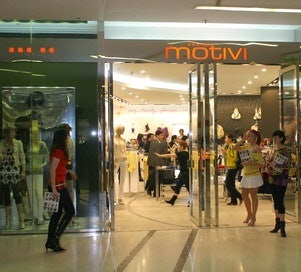Domestic Private Equity Firm Looks To Join International Fashion Industry#

Motivi store in China (Image: Miroglio)
In the latest example of a Chinese investment firm looking to "go global", Mandarin Capital Partners, the largest Sino-European private equity fund, recently announced plans to pour €40 million (US$57.9 million) into Miroglio, the second-largest women textile group in Italy. Under the deal, Mandarin Capital and Moroglio will jointly invest in the Chinese fashion industry while seeking to enhance the operational experience of Chinese fashion companies.
Part of a more than US$700 million fashion sector investment by Mandarin Capital, the agreement was included in a more than $3 billion package of deals signed in Italy last week in the presence of Italian Prime Minister Silvio Berlusconi and Chinese Vice President Xi Jinping.
Founded in 1947 and headquartered in northern Italy, Miroglio now controls 58 companies in 36 countries around the world, and employs around 12,000 employees throughout over 2,000 outlets. One of Europe's largest textiles and fashion retailers, the group has spent the last several years focusing more intently on emerging markets like China, Russia, Brazil and Turkey. In China, the Miroglio Group is perhaps best known for its fast fashion brand Motivi, a favorite among young female shoppers. Aimed at the same consumer base as brands like Zara, Motivi currently has locations in Shanghai, Beijing, Harbin, Dalian and Shenzhen, with plans to open more than 100 new outlets in China over the next three years.
A partnership between two major Chinese banks, China Development Bank and the Export-Import Bank of China, and the second-largest Italian Bank, Intesa Sanpaolo, Mandarin Capital Partners appears to be adopting a policy of investing in the fashion industry similar to that of China's Fosun Group. As Jing Daily recently noted, Fosun, one of China's largest private companies, recently announced plans to invest US$121 million in the Greek fashion house Folli Follie to help the latter more effectively tap China's growing consumer market. In addition, Fosun earlier announced an additional $600 million joint investment fund with Prudential Financial designed to invest in Chinese companies as well as foreign firms.

Miroglio plans to open 100 Motivi outlets in next three years to response to increasing demand from Chinese consumers (Image: Miroglio)
While European companies like Miroglio and Folli Follie have benefited from the fashion investment craze taking hold among Chinese investment firms, some in China are left asking: why aren't they investing more in home-grown brands? As China's Caijing suggests this week, these Chinese upstarts may find it even harder to catch up with their increasingly well-capitalized, expansion-minded foreign counterparts if this uneven investment continues. From Caijing (translation by Jing Daily team):
Over the years, a large number of top European brands have accumulated a great deal of experience in terms of product design and development, marketing, retail management and talent training. In contrast, many domestic Chinese fashion companies lack a clear perspective of brand positioning and development. Up to now, few could name a Chinese brand that could stand out in the international market, partly due to the homogeneous nature of competitors in the Chinese domestic market.
As labor costs and raw material prices continue to rise, Chinese companies will have to enhance brand image and operational efficiency in order to survive in such a competitive world.
Whether the current trend of Chinese firms investing in international brands (usually with China-facing intentions) ultimately will benefit home-grown brands will remain to be seen. Unfortunately for Chinese brands, despite their efforts to reposition themselves on equal footing to European imports, Chinese consumers--and investment funds--still seem to have a "brand bias" that will likely take years to change.